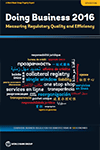Overview
Being connected to an electrical grid is essential for firms worldwide – and Doing Business measures the steps, time and cost to get a new connection. But the connection itself is not enough to measure the availability of electricity supply to a business. As a result, this year a new index has been introduced to measure the reliability of electricity supply and transparency of tariffs. A reliable electricity supply is vital for the operation of any business, as is the transparency of the tariffs for the advance planning of future expenses. The new index is based on quantitative data on the duration and frequency of power outages as well as qualitative information on how utilities and regulators handle power outages, and how tariffs and tariff changes are communicated to customers. As Doing Business data suggest, governments can use regulatory measures to encourage good practices in electricity supply systems. These regulatory measures need to strike a right balance, ensuring that customers receive a reliable and reasonably priced electricity supply without compromising utilities’ revenues. Utilities can also take practical measures to increase the reliability of supply and the accessibility of tariff information to customers.
Main Findings
- This year Doing Business collected new data in 189 economies on the price of electricity and the overall quality of electricity supply.
- High electricity prices and frequent power outages constrain the operations of businesses and affect entrepreneurs’ decisions on whether to establish a business and on how to operate it.
- A sound regulatory environment can help ensure a stable electricity supply. In 131 of the 189 economies covered by Doing Business, a national energy regulator monitors the frequency and duration of power outages. In 66 of these economies utilities compensate customers or pay fines if outages exceed the limits set by the regulator.
- Electricity tariffs for commercial customers typically range from 10 to 30 cents per kilowatt-hour, but prices in some economies are much higher. Tariffs need to strike a balance—remaining affordable to customers while enabling the utility to recover costs and make a profit.
- Information about tariffs needs to be clear and easily accessible to customers. Making tariffs readily available and providing advance notice of changes in tariffs can help businesses manage their costs.

